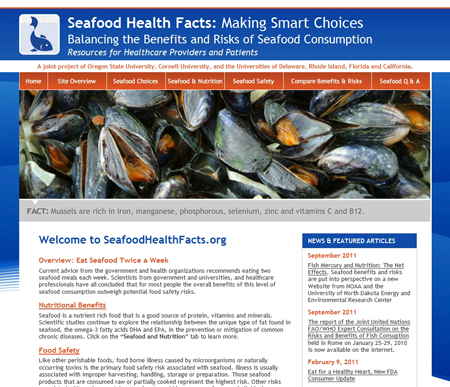New Website Launched to Clarify Health Benefits and Risks Associated with Seafood Consumption
Contact: Ken Gall, NYSG’s Seafood Specialist, E: klg9@cornell.edu, P: 631.632.8730
Stony Brook, NY, October 4, 2011 - A new Web site aimed at helping consumers weigh the benefits against possible risks of eating seafood has just been launched, and organizers hope the site will help clear up many of the myths surrounding seafood.
The site,
seafoodhealthfacts.org, developed largely through a grant from the U.S. Department of Agriculture, was created to serve as a credible resource to health care professionals and consumers, said New York Sea Grant Seafood Specialist Ken Gall, who was the primary developer of the new Web site and is the Cornell University Co-Investigator for the project.

The initiative, Seafood Health Facts: Making Smart Choices, included researchers from Oregon State University, Cornell University, and the Universities of Delaware, Rhode Island, Florida, and California, along with the non-profit Oregon Community Seafood Initiative. The end result is a user-friendly, comprehensive website and downloadable brochures aimed at health care professionals and consumers.
“We finally have a straightforward and comprehensive guide for health care professionals and consumers alike to educate themselves on the importance and the risks of consuming seafood,” said Dr. Mike Morrissey or Oregon State University’s Food Innovation Center. “Our program has synthesized all the available information from government agencies and leading universities and we’ve made it accessible, not just to health care providers but also to the general public. Consumers should feel confident about their seafood choices—and Seafood Health Facts answers their questions in a credible and balanced way.”
Heather Mann, Director of the Community Seafood Initiative, added: “Today’s consumers are bombarded with conflicting information about the benefits and risks of consuming seafood. From health magazines to mainstream media, the message about seafood is confusing at best and even conflicting at worst. Can I eat seafood while I’m pregnant? What’s the mercury risk? Should I get my Omega 3’s from supplements versus eating seafood? To complicate matters more, advice from physicians and even from our own various government agencies is often at odds. Throw in advocacy group agendas and a potential seafood consumer is more likely to choose chicken.”
The information on the site is organized by topic and includes resources for seafood nutrition and the benefits of seafood consumption, seafood safety and the risks associated with certain types of seafood, a comparison of the risks and benefits of seafood consumption, and the seafood supply in the United States. It is also organized to provide resources aimed at specific population groups.
New York Sea Grant, now in its 40th year, is a statewide network of integrated research, education, and extension services promoting the coastal economic vitality, environmental sustainability and citizen awareness about the State's marine and Great Lakes resources. One of 32 university-based programs under the NOAA’s National Sea Grant College Program, NYSG is a cooperative program of the State University of New York and Cornell University.